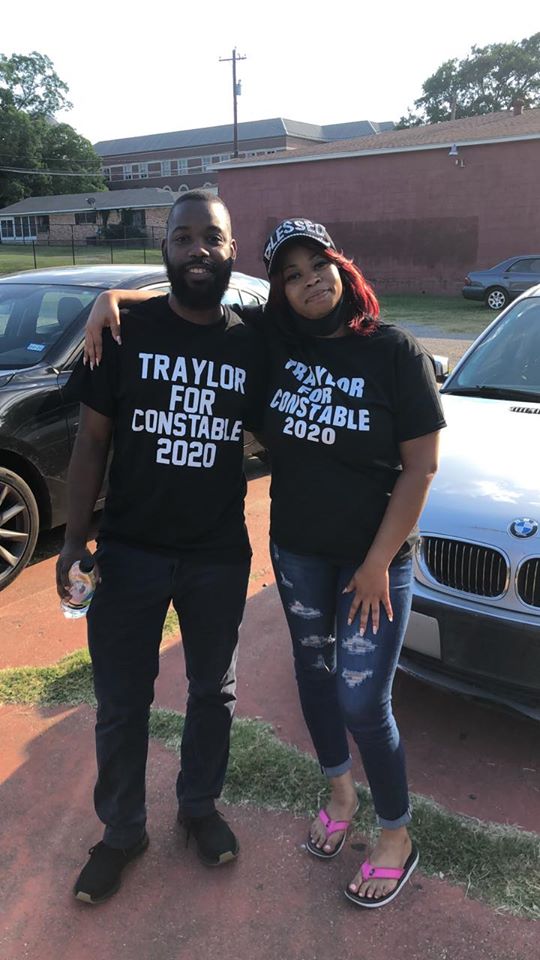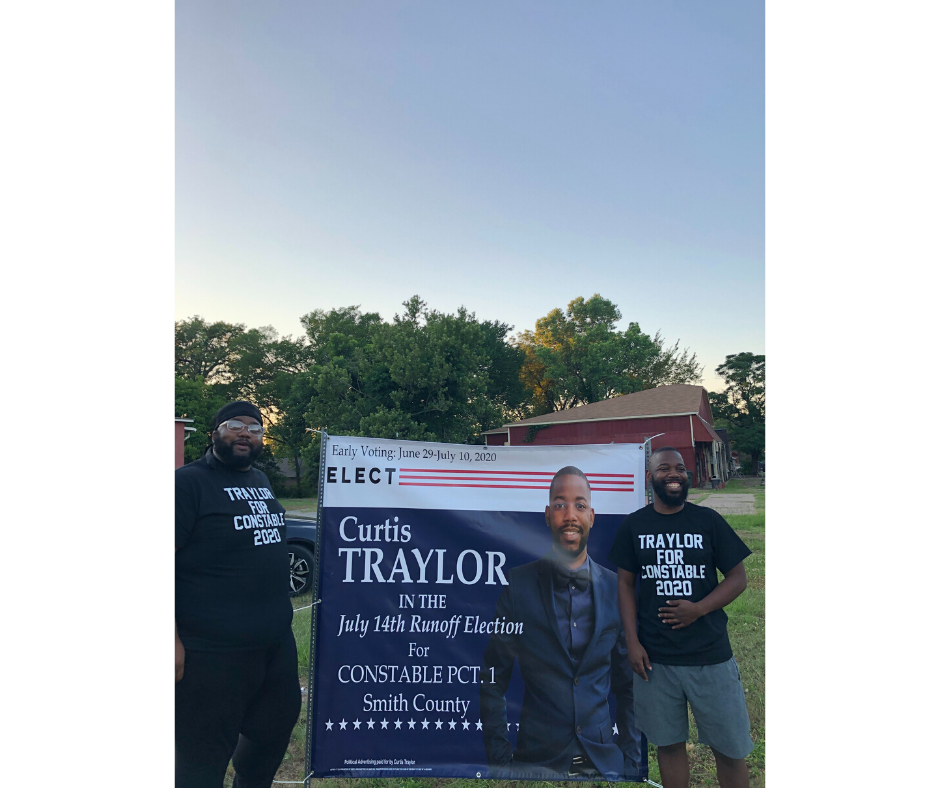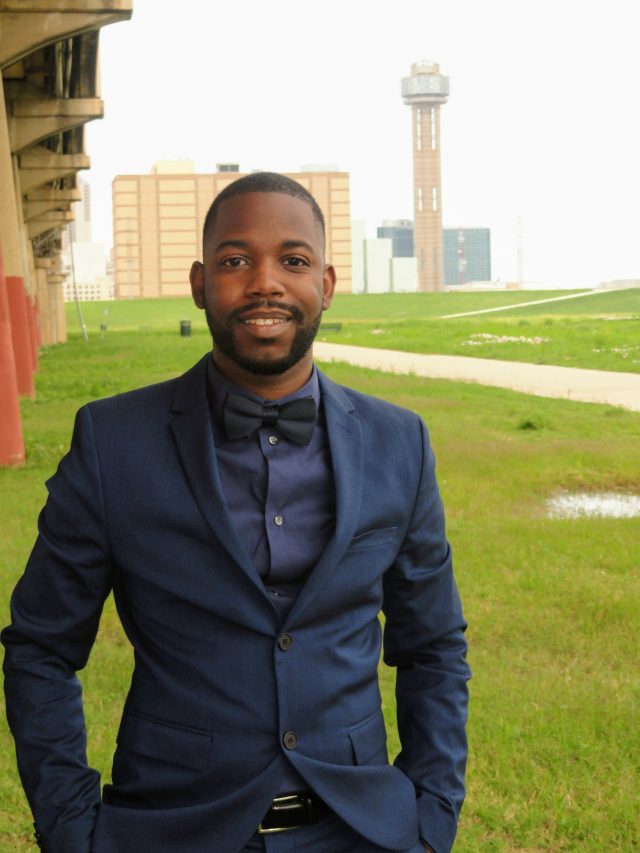After facing several challenges in court, the race for the Democratic representative for Precinct 1 constable has left voters with two candidates in the upcoming run-off election on July 14th. As no Republican candidates are running for the office, the run-off will determine the next Precinct 1 constable.
With the election approaching, The Tyler Loop talked with both candidates to understand their platforms and plans for Precinct 1, as well as what it means to be a Black man running for a law enforcement office as protests against racial injustice in policing are rising across the country — even here in Tyler.
Here, we speak with Corrections Officer Curtis Traylor, a man who was born and raised in North Tyler and earned 10.47% of the vote in the initial three-way race.
The Tyler Loop also interviewed Traylor’s opponent, Bobby Garmon, who was appointed to the position of Precinct 1 constable in 2017 and earned 38.32% of the vote earlier in this race.
This conversation has been edited for length and clarity. All photos are courtesy of Curtis Traylor.
You are running a platform that calls for training in human trafficking, up staffing and diversifying in the Constable’s Office, as well as leniency on marijuana possession. Walk me through the most important parts of your platform and why they matter to Precinct 1.
The most important one to me would be diversifying the office to include women deputies in the program. Under Henry Jackson, we had two female deputies, but once appointed-Constable Garmon came in, those contracts were cut. Those were the only two female constable deputies in the entire county. It’s bringing back diversity to that office to show that women are able to police and that they are able to lead in the law enforcement community.
Why do you think bringing women into Precinct 1’s constable department is important?
It’s important for young minority females to see themselves in those positions. Being able to see a reflection of yourself in certain positions is important to our community. Right now, we have anti-police sentiment going on where it’s hard to recruit police officers, and people don’t really like police officers. It’s being able to see people from your community who look like you, who are doing a good job in those positions and inspiring young people to take up that torch later on.
Let’s talk about your proposition of human trafficking training.
That is very important because, in minority communities, it’s one of the biggest issues of our time besides police reform. Every year, thousands of women and children of color go missing. That’s one of the biggest areas that law enforcement needs to be focusing on. It happens at early ages, and that’s something that I want to stop in our community because it’s prevalent for minorities.
Tell me about your leniency on marijuana possession because that could be a very controversial policy here in East Texas.

When you look at all the major metropolitan areas in Texas — Houston, Dallas, Fort Worth, San Antonio, Austin — they’re going toward the position of decriminalizing marijuana. It ruins people’s lives when they have those records of drug possessions. One of the things I want to do as a young person coming into a leadership position is leading on that issue. But we still have laws in place that are arresting people of color at disproportionate rates for using marijuana and for having small possessions of marijuana. I want to get to the place where we start to decriminalize it, and we’re not ruining people’s lives over a small amount of marijuana.
How would up-staffing the Constable’s Office help Precinct 1?
I want to do the up-staffing and expanding to bring structure to the office. Right now, there’s no real structure for putting the chief deputy in place and having deputies for specific tasks. The ultimate role of the Constable’s Office is to provide security for the Justice of the Peace Court. There’s no dedicated officer for the Justice of the Peace Court. They just kind of wing it right now. My reason for expanding the office is to create a chain of command and create that structure.
You’ve talked about implementing an internship program with the Constable’s Office. Can you just kind of walk me through what that would look like?
It will be a year program. For the first six months, they’ll be training in the office of the constable. They’ll be riding out with the deputies, they’ll be watching how we do our job, what we’re doing and how we’re helping the community. The second six months is when we sponsor them through the police academy to get licensed as peace officers.
I reached out to the dean of colleges at Texas A&M University. They have a bachelor’s degree program in place, which is competency-based, and it’s work-at-your-own-pace. In completing the program with us, they’ll earn 30 hours of college credit towards their bachelor’s degrees going forward if they choose to enroll in that program also.

Why do you think having that internship program is important to Precinct 1?
It goes back to people being in those positions that we want to see a change in. As they say, if you want to change something, sometimes you have to become a part of the organization and change it from within. It’s getting more young people interested in law enforcement field going forward, so they’re reflected in it, so they see themselves every day out in the community and see people that look like them policing them. It gives them the impression of “maybe this is not so bad of a profession.”
You’ve been very vocal about police reform. What reforms would you like to see implemented as constable?
The big thing going on now is “defund police.” People misconstrue that word “defund.” It doesn’t mean we’re getting rid of the police departments. It means we’re refocusing the budget of police departments, and we’re not looking for more and more and more manpower. Instead, we’re focusing on social issues and how we can help people in certain situations where police don’t have to be called.
There’s a lot of situations where police should not be called. But we put so much on our police officers in this country that we expect them to solve everything, from civil issues to domestic disputes to mental illness — all of these things that police should not be having to deal with, they’re having to deal with. The outcomes aren’t that great because they’re not trained to deal with those issues. The biggest thing is in reforming police, getting to a place where we’re prioritizing our police budgets to focus on mental illness and domestic issues, getting support in those instances and having police completely removed from that situation unless it’s absolutely necessary.
What would be a reform that you’d implement on day one as constable?
The biggest reform I would do as constable is reaching out to the Tyler Police Department and the Sheriff’s Department and letting them know if we have domestic issues or we have mental illness issues, that’s one of the things we’ll be training our officers in. So reach out to us, give us a call, let us come out and try to handle it before it escalates into something big so we get people the help that they actually need instead of putting them in jail for something that the jail probably can’t handle anyway.
We’ve seen protests against police brutality and police killings of unarmed Black people rise across the country lately, even here in Tyler. As a Black man in law enforcement, what do you hope to do to make a difference?
Bringing our perspective. The biggest issue is miscommunication between officers of color and white officers. That’s one of the biggest obstacles in police reform, trying to understand people and our backgrounds, and getting to know who we’re working beside as law enforcement officers. That doesn’t happen often. You have the wall of secrecy within the police where you see something, but you don’t necessarily want to tell because of the backlash that comes with it.
How would you start to build those bridges between Tyler’s police and Sheriff’s Department and your role as a constable?
Day one is reaching out and having a conversation with Sheriff Smith, Tyler P.D. and all the other constables in Smith County, and getting on one page and seeing how we can help each other be successful in policing going forward, and building those relationships that we need that have been lacking for so long. One of the things that Constable Garmon did was start to build those bridges to the Sheriff’s Department and to Tyler P.D. That’s something that I do want to continue because it’s beneficial to the Precinct 1 community.

People are now wanting to have a say in what happens in policing in their communities. What do you think are the most pressing needs in Precinct 1’s community, and how would you use your position as constable to help them?
The most pressing need for Precinct 1 is having the representation that they want from the people that they want in a leadership position, and people in those leadership positions are doing the right thing. That’s what I intend to do. When you look at the race thus far, with the many twists and turns it has taken, it’s because the community wants a certain caliber of person in that position. They don’t want somebody that the county has picked for them — they want to be able to choose who represents them. It’s allowing them to choose the representation that they want and that position of leadership doing the right thing for Precinct 1.
So how would you start those lines of communication between your office and your constituents?
What I have been doing since I’ve started campaigning is reaching out to the different community organizations that are doing a lot of philanthropy work, such as the Wild Bunch Motorcycle group and other community leaders, such as the NAACP president, and reaching out to other millennials who are stepping up to the plate and leading. It’s connecting with other millennials who have the same vision and getting that message out to the mass of Precinct 1 and asking, “How do we move forward from here?”
You’re running against an opponent with more than 40 years in law enforcement. So what makes you, a millennial, the most qualified candidate to be Precinct 1 constable?
I’ve been in law enforcement for roughly 14 years. I started as a corrections officer. From there, I went to work as a detention officer for different sheriff’s offices, and then I transferred to the state juvenile justice department. In each of those positions, I had the opportunity to work with people not only just behind bars, but with the youth that comes from our communities who are troubled or who are trying to figure out who they are in this world. I’ve had the opportunity to work with people from different backgrounds, whether they’re white, Black, Hispanic, young, old — I’ve been there. I think being able to relate to people, to lend an ear to them, gives me an advantage over my opponent. One of the biggest complaints of the office is that it doesn’t reach out to the community. I’ve done a lot of hands-on experience with young people and with adults that I think gives me the advantage over my opponent, who has 40 years experience, but it’s not as in-depth as what I have been doing for the past 14 years.
Constable Garmon has pointed out that you don’t have much experience in a patrol car. Do you think that’s needed to be constable of Precinct 1?
Well, he’s wrong in that aspect. Once I graduated from the police academy in 2017, I went through an almost six-month on-the-job program where you’re training out in the field. Once that program is complete and you pass all those phases, then you do go back to your regular position, which is back inside the jail. I’ve had the training. I just haven’t been a full-time peace officer.
In one video posted on Facebook, you called the constable duties “small,” comparing running a home budget to managing the constable’s budget. Would you mind expanding on what you meant?
The Constable’s Office currently has two full-time deputies, a full-time clerk and a part-time clerk. Their annual budget is about $345,000. It’s not a huge budget where it’s not manageable by someone who has taken basic math courses. For me, it’s similar to managing a home budget. I earned my bachelor’s degree in 2015 from Southern New Hampshire University in criminal justice. I think that gives me an advantage because I have knowledge of the criminal justice field, and I have people who are willing to help in areas where I lack experience. That includes former Constable Henry Jackson and deputies who are there currently, who are ready to step up and step in.
Voters and your opponent have accused you of not being involved in this community and have challenged your claim to residency in Precinct 1. How are you defending your place in Precinct 1’s community?
I was born and raised in Precinct 1. I was raised in North Tyler. I attended Ramey Elementary, Boulder Middle School and John Tyler High School. I graduated from Robert E. Lee in 2006. I have deep roots in that community. There’s a difference between someone coming in and working in our community and someone being born and raised in our community and having a stake in our community. I work in North Texas at a facility about an hour and a half north of Dallas. I spend my workweeks in Dallas, but when I’m off, I come home back to Tyler where I pay taxes on my property. That’s why I choose to claim my residency, [in Tyler] because it’s home.
The election for Precinct 1 constable has been extremely contentious with many legal battles, and you’ve stated that you weren’t aware of many of the appeals that were made. In one interview with Tyler Morning Telegraph, you said the election has been “stolen from the citizens.” What makes weathering this race worth it?
It makes it worth it to me because it’s the place where I was born and raised, and even though I left after high school for a while to better my career and finish school, North Tyler will always be home to me. My best memories are growing up in Tyler, with my family and friends and classmates. Precinct 1 is home for me — the people, I love them to death. So if they felt like their voices weren’t being heard, for me, being in that race — period — whether you came out with 1% of the vote or 100% of the vote, is a duty to my community to give them a choice going forward. I have several other options and things going on in my life that I could be doing, but right now the most important thing to me is representing my community.
Thanks for reading this story. Just one more thing. If you believe in the power of local journalism here in Tyler, I'm hoping that you'll help us take The Loop to the next level.
Our readers have told us what they want to better understand about this place we all call home, from Tyler's north-south divide to our city's changing demographics. Power, leadership, and who gets a seat at the table. How Tyler is growing and changing, and how we can all help it improve. Local arts, culture, entertainment, and food.
We can't do this alone. If you believe in a more informed, more connected, more engaged Tyler, help us tell the stories that need to be told in our community. Get free access to select Loop events, behind-the-scenes updates about the impact and goals of our work, and, above all, a chance to play a part in bringing more fresh, in-depth, unexpected journalism to Tyler.








